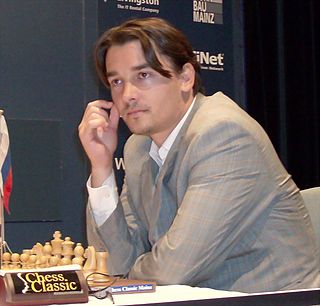A Quote by Vladimir Kramnik
On the whole, the life of a chess professional is not as easy as it appears at first sight. One needs to devote some ten hours a day to chess and to everything connected with it - physical and psycholgical preparation.
Related Quotes
I started playing chess when I was about 4 or 5 years old. It is very good for children to learn to play chess, because it helps them to develop their mental abilities. It also helps to consolidate a person's character, because as it happens both in life and in a chess game we have to make decisions constantly. In chess there is no luck and no excuses: everything is in your hands.
I love chess, and I didn't invent Fischerandom chess to destroy chess. I invented Fischerandom chess to keep chess going. Because I consider the old chess is dying, it really is dead. A lot of people have come up with other rules of chess-type games, with 10x8 boards, new pieces, and all kinds of things. I'm really not interested in that. I want to keep the old chess flavor. I want to keep the old chess game. But just making a change so the starting positions are mixed, so it's not degenerated down to memorisation and prearrangement like it is today.
I was a professional chess player in Romania, but only a small-time master. When I came to France, I continued playing chess for many years: I played tournaments in numerous countries with mixed results. I wrote and published a book - La Défense Alekhine and translated two others from Russian. I taught chess in schools; I earned more money through chess than through literature.
Like Dvoretsky, I think that (all other things being equal), the analytical method of studying chess must give you a colossal advantage over the chess pragmatist, and that there can be no certainty in chess without analysis. I personally acquired these views from my sessions with Mikhail Botvinnik, and they laid the foundations of my chess-playing life.
Chess teaches foresight, by having to plan ahead; vigilance, by having to keep watch over the whole chess board; caution, by having to restrain ourselves from making hasty moves; and finally, we learn from chess the greatest maxim in life - that even when everything seems to be going badly for us we should not lose heart, but always hoping for a change for the better, steadfastly continue searching for the solutions to our problems.




























